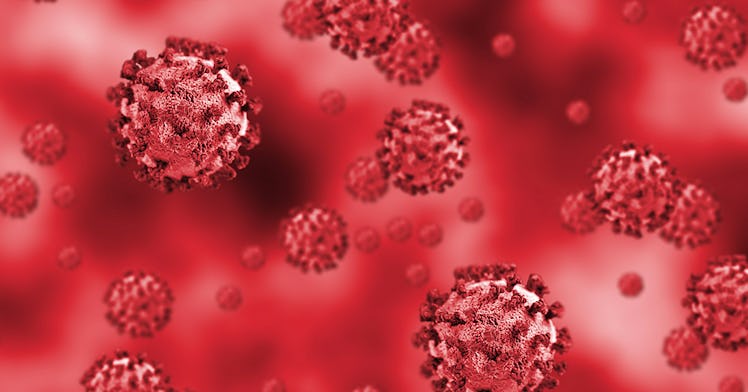The Lambda Variant: Everything Parents Need to Know About the COVID Mutation
You’re worrying about Delta. Do you need to add Lambda to the list?

Experts are only just now learning about the habits of the Delta variant, the main driver of the current surge in the U.S. COVID-19 pandemic. It spreads rapidly, it could possibly be more deadly, and asymptomatic breakthrough cases are probably happening with some frequency. As if all these unknowns and half-knowns aren’t enough, there’s another variant that is giving researchers goosebumps. Yes, Lambda. This variant may be resistant to the COVID vaccines and more infectious yet. But with only 3,958 cases verified worldwide (and 851 in the U.S.) many researchers are still watching and waiting.
Before we panic (are we even capable of that anymore?): Lambda is a mutation of SARS-CoV-2, meaning the public should not toss our good habits and learned cautions out the window. This isn’t March of 2020, when the public health experts thought handwashing would solve our problems and laughed at the cautious few who were masking up. Vaccines and masks will very much slow the spread of this variant. Virologists too aren’t starting from scratch. There’s a fair amount they can intuit from the limited data about Lambda.
The bottom line? Now’s a time to be cautious as hell. The unknowns on Delta and Lambda are many, the knowns are worrisome, and the kids still aren’t vaccinated. But we’ve been through this before, and as much as it sucks, we can do it again.
What is the Lambda Variant?
The Lambda variant is a mutated version of SARS-CoV-2, the virus that causes COVID. It’s been called a “sort of cousin of the Alpha variant.” Lambda was first discovered in Lima, Peru in December 2020. In June the World Health Organization added the variant to its watchlist because of the rapid way it moved through South America.
The WHO has named Lambda a ‘Variant of Interest,’ a step below ‘Variant of Concern,’ the designation given to Delta. Meanwhile, the Centers for Disease Control and Prevention does not include Lambda on its official watchlist, though it has said that it “will continue to actively monitor this variant.”
Where is the Lambda Variant?
The Lambda variant can predominantly be found in South America. It makes up the vast majority of new cases in Peru and has expanded to Ecuador, Chile, and Argentina. In total, Lambda has been detected in at least 36 countries so far and in 44 U.S. states. But compared to Delta, its progress has been slow.
Genetic sequencing has identified just 851 Lambda-caused COVID cases in the U.S. Eight of those cases were recorded in the last month. For comparison, Delta was first recorded in the U.S. in March, and nearly 60,000 US cases have been linked to the variant since then. And although the U.S. doesn’t sequence every case, experts are still confident that Lambda doesn’t have a large foothold in the country.
Does the Lambda Variant Spread Faster or Differently?
There’s concern that Lambda carries two mutations that could make it more infectious than the original virus. One of those mutations, called L452Q/R, Lambda has in common with the Delta variant, according to a preprint study from researchers in Tokyo that has not yet been peer-reviewed.
However, there isn’t yet data demonstrating that Lambda actually makes people sicker, spreads faster, or evades the vaccine. That’s what it will take for the WHO to call it a Variant of Concern.
Is the Lambda Variant Deadlier?
There’s not enough evidence to know if Lambda is killing more people than the original virus. Peru — the country where Lambda is most prevalent — does have the world’s highest COVID mortality rate. But researchers haven’t directly attributed the country’s devastating COVID outcomes to the Lambda variant. Even if Lambda is to blame for the high rates of deaths in Peru, experts say that it’s unlikely to take off in the U.S. in the same way because of the Delta variant’s dominance.
Do the COVID Vaccines Stop Lambda?
The data are divided on how Lambda measures up to the COVID vaccines. The preprint study from Tokyo found that Lambda has three mutations that make it resistant to antibodies produced by the vaccine. Research done at New York University, which has also not yet been peer-reviewed, found that Lambda had about the same amount of mRNA vaccine-resistance as Delta. On the whole, however, the vaccines were still highly effective at fighting the Lambda and Delta variants. The Johnson & Johnson vaccine was much less effective against Lambda, according to the preprint study.
What Are Experts Saying About the Lambda Variant?
“It is not anywhere near as concerning as the Delta variant,” S. Wesley Long, MD, PhD, medical director of diagnostic microbiology at Houston Methodist Hospital, told the Washington Post. “That’s the engine that’s going to be driving the surge in the U.S.”
“Delta is clearly dominating right now. And so I think our focus can remain on Delta as a hallmark of a highly infectious variant,” Stuart Ray, MD, a professor of medicine and infectious disease specialist at the Johns Hopkins Hospital, told NPR.
“[Lambda] really doesn’t seem to take off once it’s reported in a country,” Maria Van Kerkhove, the WHO’s COVID technical lead, said in a press conference. And although Lambda has been reported in almost 40 countries, most of these countries report less than 10 sequences, she said.
How Worried Should Parents (and Kids) Be?
The WHO and U.S. federal organizations are actively monitoring Lambda’s spread. But for now, Lambda’s low prevalence means it shouldn’t be a major source of worry for your family. Steps you’re already taking to prevent other variants, such as getting vaccinated and masking in crowded indoor settings, are exactly what you should be doing to protect your family from the Lambda variant.
This article was originally published on